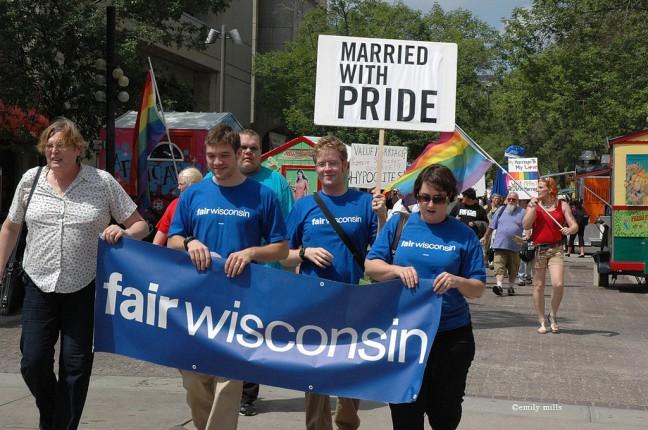On April 16, lesbian couple Katherine and Linda Halopka-Ivery of Milwaukee filed a lawsuit in the Wisconsin State Supreme Court challenging a section of the Wisconsin State Constitution that defines marriage as being between one man and one woman, thus excluding same-sex marriage. This lawsuit is not just a legitimate questioning of the state’s constitution that brings new and relevant points of discussion to the desk of the Wisconsin Supreme Court Justices. In a larger sense, it also highlights the progress of the LGBTQ rights movement across the nation.
The state’s constitution was amended to include the definition of marriage as one man and one woman in November 2006 after passing through two consecutive sessions of the state Legislature and popular referendum by the people — one of the most rigorous state constitution amendment processes in the country. At the time of the referendum, the amendment was approved by the people of Wisconsin by an overwhelming margin of 19 percent. However, in the seven years since the amendment passed, the numbers on public opinion of same-sex marriage have all but completely flipped. A poll conducted in October 2013 by Marquette University Law School showed that 53 percent of Wisconsinites polled now believe that same-sex couples should be given the legal right to marry. That’s a 13 percent increase in support of same-sex marriage over approximately seven years. This change in public opinion not only indicates how far the movement has come, but it also means that if an amendment to legalize same-sex marriage was proposed today, it would likely be passed into law.
As it currently stands, 17 states and the District of Columbia fully recognize same-sex marriage. This number is remarkable given that nearly a decade ago same-sex marriage was not acknowledged in any state. Among other rationale, the Wisconsin lawsuit challenges the legitimacy of the Wisconsin constitutional ban in light of the recent federal Supreme Court decision United States v. Windsor. In the case, the court ruled that it is unconstitutional for the federal government to hold the definition of marriage to just heterosexual couples. The landmark decision, made in 2013, was the catalyst for same-sex couples across the nation to challenge the marriage barriers in their own states. While the sole other challenge to the Wisconsin ban was unsuccessful, this lawsuit is the first in Wisconsin to question the substantive effects of a definition of marriage that places value on gender and not on love. This is something that other courts have been responsive to, as evidenced by the fact that five court cases filed within the last year concerning the respective same-sex marriage bans in Utah, Oklahoma, Virginia, Texas and Michigan are pending appeal after federal judges found them unconstitutional.
Wisconsin has been a remarkably conservative state when it comes to marriage equality. Not only does the state not legally allow same-sex marriage within its borders or recognize the same-sex marriage certificates of other states, it indirectly makes Wisconsin residents that leave the state for a same-sex marriage criminally liable. This is one of the most severe statements against marriage equality. If this amendment can be scribbled out of the Wisconsin constitution, it is not only a definite win for Wisconsin couples, but also an indicator that nationwide recognition of same-sex marriage is possible.
If the Wisconsin Supreme Court makes the right decision and allows the lawsuit to come to fruition, thereby granting the legal recognition of marriage to all couples gay, straight or otherwise, it will not only be a turning point in the state’s history for love and equality. It will also mark a decisive point in the battle for marriage equality across the nation.
It remains to be seen how the lawsuit will fare, but one thing is for certain: If marriage equality can come to Wisconsin, it has a real shot of making it anywhere in the United States.
Madeline Sweitzer ([email protected]) is a freshman majoring in political science and intending to major in journalism.
[Photo by Flickr user Emily Mills]














